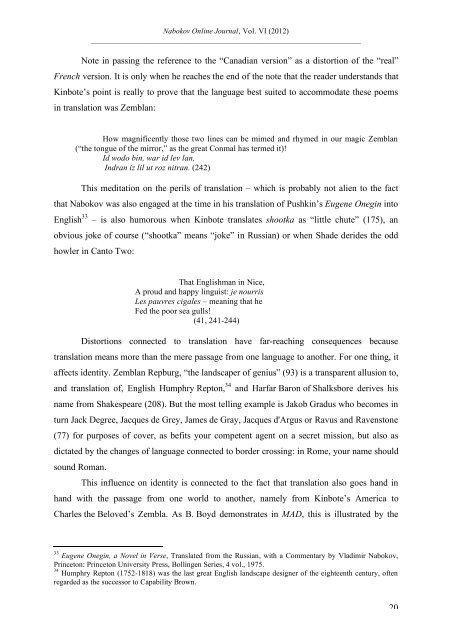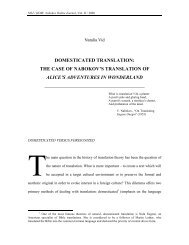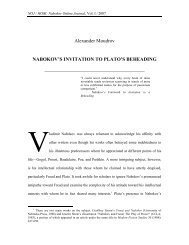through the looking-glass – pale fire as anamorphosis
through the looking-glass – pale fire as anamorphosis
through the looking-glass – pale fire as anamorphosis
Create successful ePaper yourself
Turn your PDF publications into a flip-book with our unique Google optimized e-Paper software.
Nabokov Online Journal, Vol. VI (2012)<br />
_______________________________________________________________________<br />
Note in p<strong>as</strong>sing <strong>the</strong> reference to <strong>the</strong> “Canadian version” <strong>as</strong> a distortion of <strong>the</strong> “real”<br />
French version. It is only when he reaches <strong>the</strong> end of <strong>the</strong> note that <strong>the</strong> reader understands that<br />
Kinbote’s point is really to prove that <strong>the</strong> language best suited to accommodate <strong>the</strong>se poems<br />
in translation w<strong>as</strong> Zemblan:<br />
How magnificently those two lines can be mimed and rhymed in our magic Zemblan<br />
(“<strong>the</strong> tongue of <strong>the</strong> mirror,” <strong>as</strong> <strong>the</strong> great Conmal h<strong>as</strong> termed it)!<br />
Id wodo bin, war id lev lan,<br />
Indran iz lil ut roz nitran. (242)<br />
This meditation on <strong>the</strong> perils of translation <strong>–</strong> which is probably not alien to <strong>the</strong> fact<br />
that Nabokov w<strong>as</strong> also engaged at <strong>the</strong> time in his translation of Pushkin’s Eugene Onegin into<br />
English 33 <strong>–</strong> is also humorous when Kinbote translates shootka <strong>as</strong> “little chute” (175), an<br />
obvious joke of course (“shootka” means “joke” in Russian) or when Shade derides <strong>the</strong> odd<br />
howler in Canto Two:<br />
That Englishman in Nice,<br />
A proud and happy linguist: je nourris<br />
Les pauvres cigales <strong>–</strong> meaning that he<br />
Fed <strong>the</strong> poor sea gulls!<br />
(41, 241-244)<br />
Distortions connected to translation have far-reaching consequences because<br />
translation means more than <strong>the</strong> mere p<strong>as</strong>sage from one language to ano<strong>the</strong>r. For one thing, it<br />
affects identity. Zemblan Repburg, “<strong>the</strong> landscaper of genius” (93) is a transparent allusion to,<br />
and translation of, English Humphry Repton, 34 and Harfar Baron of Shalksbore derives his<br />
name from Shakespeare (208). But <strong>the</strong> most telling example is Jakob Gradus who becomes in<br />
turn Jack Degree, Jacques de Grey, James de Gray, Jacques d'Argus or Ravus and Ravenstone<br />
(77) for purposes of cover, <strong>as</strong> befits your competent agent on a secret mission, but also <strong>as</strong><br />
dictated by <strong>the</strong> changes of language connected to border crossing: in Rome, your name should<br />
sound Roman.<br />
This influence on identity is connected to <strong>the</strong> fact that translation also goes hand in<br />
hand with <strong>the</strong> p<strong>as</strong>sage from one world to ano<strong>the</strong>r, namely from Kinbote’s America to<br />
Charles <strong>the</strong> Beloved’s Zembla. As B. Boyd demonstrates in MAD, this is illustrated by <strong>the</strong><br />
33 Eugene Onegin, a Novel in Verse, Translated from <strong>the</strong> Russian, with a Commentary by Vladimir Nabokov,<br />
Princeton: Princeton University Press, Bollingen Series, 4 vol., 1975.<br />
34 Humphry Repton (1752-1818) w<strong>as</strong> <strong>the</strong> l<strong>as</strong>t great English landscape designer of <strong>the</strong> eighteenth century, often<br />
regarded <strong>as</strong> <strong>the</strong> successor to Capability Brown.<br />
20
















